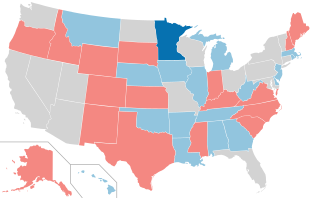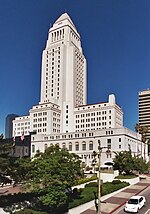
Thomas Bradley was an American politician, athlete, police officer, and lawyer who served as the 38th Mayor of Los Angeles from 1973 to 1993. Tom Bradley was Los Angeles' first Black mayor, first liberal mayor, and longest-serving mayor. A Democrat, Bradley's multiracial liberal political coalition was a forerunner of future President of the United States Barack Obama's coalition in the 2008 and 2012 presidential elections.

The 1998 United States Senate elections were held on November 3, with the 34 seats of Class 3 contested in regular elections. This was seen as an even contest between the Republican Party and Democratic Party. While the Democrats had to defend more seats up for election, Republican attacks on the morality of President Bill Clinton failed to connect with voters and anticipated Republican gains did not materialize. The Republicans picked up open seats in Ohio and Kentucky and narrowly defeated Democratic incumbent Carol Moseley Braun, but these were cancelled out by the Democrats' gain of an open seat in Indiana and defeats of Republican Senators Al D'Amato and Lauch Faircloth. The balance of the Senate remained unchanged at 55–45 in favor of the Republicans.

The 1992 United States Senate elections, held November 3, 1992, were elections for the United States Senate. The 34 seats of Class 3 were contested in regular elections, along with special elections to fill vacancies. They coincided with Bill Clinton's victory in the presidential election. This was the first time since 1956 that the balance of the Senate remained the same.

The 1990 United States Senate elections were held on Tuesday, November 6, 1990, with the 33 seats of Class 2 contested in regular elections. Special elections were also held to fill vacancies. The Democratic Party increased its majority with a net gain of one seat from the Republican Party. The election cycle took place in the middle of President George H. W. Bush's term, and, as with most other midterm elections, the party not holding the presidency gained seats in Congress.

The 1984 United States Senate elections were held on November 6, with the 33 seats of Class 2 contested in regular elections. They coincided with the landslide re-election of President Ronald Reagan in the presidential election. In spite of the lopsided presidential race, Reagan's Republican Party suffered a net loss of two Senate seats to the Democrats, although it retained control of the Senate with a reduced 53–47 majority. Democrats defeated incumbents in Illinois and Iowa, and won an open seat in Tennessee, while Republicans defeated an incumbent in Kentucky.

United States gubernatorial elections were held on November 7, 2006, in 36 states and two territories. The elections coincided with the midterm elections of the United States Senate and the United States House of Representatives.

John Ferraro was an American politician and businessman who was a Democratic member of the Los Angeles City Council from 1966 until his death in 2001, the longest tenure of any member in the city's history. Before politics, he was an insurance broker, and had been an all-American football player at the University of Southern California.

José Cristóbal Aguilar was a Californio politician and journalist, who served three terms as Mayor of Los Angeles, the last Hispanic to hold the office until 2005, with the election of Antonio Villaraigosa.

The 1993 Los Angeles mayoral election took place on April 20, 1993, with a run-off election on June 8, 1993. This was the first race in 64 years that an incumbent was not on the ballot. It marked the first time in 24 years that retiring Mayor Tom Bradley was not on the ballot, after five consecutive victories starting in 1973. Richard Riordan became the first Republican mayor elected in 36 years.

The 1998 United States Senate election in New York was held November 3, 1998, along with elections to the United States Senate in other states, as well as elections to the United States House of Representatives and various state and local elections. Incumbent Republican U.S. Senator Al D'Amato was running for reelection to a fourth term, but was defeated by Democrat Chuck Schumer, in what was considered by many to be the "high[est] profile and nastiest" contest of the year. This was the first election since 1950 in which a Democrat was elected to the Class 3 United States Senate seat from New York, and the first time since Robert F. Wagner's re-election in 1944 that New York had sent two Democrats to the United States Senate. As of 2023, this election is the last time an incumbent Senator from New York lost re-election. Chuck Schumer's swearing-in marked the first time since 1947 that Democrats held both United States Senate seats from New York.

The 2014 Rhode Island gubernatorial election took place on November 4, 2014, to elect the Governor of Rhode Island, concurrently with the election of Rhode Island's Class II U.S. Senate seat, as well as other elections to the United States Senate in other states and elections to the United States House of Representatives and various state and local elections.

The 1949 Los Angeles mayoral election took place on April 5, 1949, with a run-off election on May 31, 1949. Incumbent Fletcher Bowron was re-elected.

The 1961 Los Angeles mayoral election took place on April 4, 1961, with a runoff election on May 31, 1961. Incumbent Norris Poulson was defeated by Sam Yorty, a former U.S. Representative.

The 1969 Los Angeles mayoral election took place on April 1, 1969, with a run-off election on May 27, 1969. Incumbent Sam Yorty was re-elected over councilmember Tom Bradley, a win that had a record-breaking turnout. Yorty used race against Bradley to paint him as a mayor who would be open to Black Nationalism and that he was inefficient against fighting crime, both were denied by Bradley as he was a police officer in the Los Angeles Police Department before his election to the council.

The 1973 Los Angeles mayoral election took place on April 3, 1973, with a run-off election on May 29, 1973. Incumbent Sam Yorty was defeated by councilman Tom Bradley in a rematch of the 1969 mayoral election.

The 1977 Los Angeles mayoral election took place on April 5, 1977. Incumbent Tom Bradley was re-elected over nine other candidates. He was mainly challenged by State Senator Alan Robbins and tax policy activist Howard Jarvis, with Robbins campaigning on his opposition to busing in the city. Bradley was widely expected to easily win re-election, and on election day, Bradley won by a landslide against the other candidates.

The 1981 Los Angeles mayoral election took place on April 7, 1981. Incumbent Tom Bradley was re-elected over former Mayor Sam Yorty. The election was a third rematch between Bradley and Yorty, the other two being in 1969 and 1973. It would be the last time a Mayor would be elected to a third term, as voters amended the city charter in 1993 to implement a two-term limit for the office of Mayor.

The 1989 Los Angeles mayoral election took place on April 11, 1989. Incumbent Tom Bradley was re-elected over ten candidates in the primary election. It would be the last time Bradley ran for mayor, as he chose to retire after his fifth term.

The 2015 United States elections were held on Tuesday, November 3. The off-year election included a special election for Speaker of the House. There were also gubernatorial and state legislative elections in a few states; as well as numerous citizen initiatives, mayoral races, and a variety of other local offices on the ballot.

The 2017 United States elections were held, in large part, on Tuesday, November 7, 2017. This off-year election featured gubernatorial elections in Virginia and New Jersey, as well as state legislative elections in both houses of the New Jersey Legislature and in the Virginia House of Delegates. Numerous citizen initiatives, mayoral races, and a variety of other local elections also occurred. Special elections were also held for one seat of the U.S. Senate, representing Alabama, and six seats of the U.S. House of Representatives. The Democrats picked up the governorship in New Jersey and the Alabama Senate seat that was up for a special election. The governorship in Virginia and the six House seats that were up for special elections did not change party hands.



















